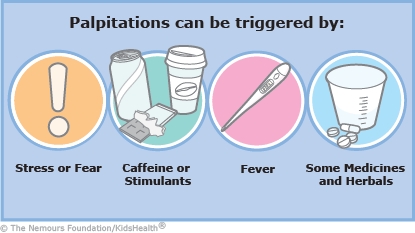Palpitations: How to Care for Your Child
Palpitations are a feeling that the heart is beating faster, louder, or with a different beat than usual. They usually aren't a sign of a health problem, and most kids who have them won't need to limit their physical activity.


-
Reassure your child that he or she is fine.
-
If your health care provider recommended, count your child's heart rate by feeling the pulse (at the neck or at the wrist) when the symptoms happen again. Count the pulse for a full minute.
-
Don't limit your child's physical activity unless the health care provider tells you to do so.
-
Cutting back on caffeine may help prevent palpitations. Caffeine is found in coffee, some sodas, energy drinks, chocolate, cold medicine, and some pain relievers.
-
Tobacco products and secondhand smoke cause palpitations in some people. If your child or anyone in the house smokes, call 1-800-QUIT-NOW for advice on quitting.
-
Be sure that your child gets a checkup with the health care provider every year. He or she may recommend that your child see a cardiologist (heart specialist).

Your child:
-
gets palpitations more often
-
feels dizzy, weak, or very tired
-
gets headaches or sweats a lot with palpitations
-
seems anxious or depressed

Your child:

What are the symptoms of palpitations? When kids have palpitations, they might describe a pounding, racing, skipping, jumping, fluttering, or "flip-flop" feeling in the chest. Younger children may say that their heart is "beeping." Parents may notice that a child's heart seems to be beating fast when holding the child close.
What does it mean if a child has palpitations? Usually, palpitations are not related to a heart problem. But in a few kids, they might be a sign of a problem with the way the electric signal travels through the heart or how the heart is pumping. Health care providers check carefully for these problems in kids with palpitations.
How do health care providers diagnose palpitations? Health care providers ask questions about what a child was doing when the palpitations happened, listen to the child's heart, and may order an EKG (electrocardiogram). An EKG is a quick, painless test that measures the heart's electrical waves to see how it's working. Sometimes a portable heart monitor is used to check a child's heartbeat for 24 hours.